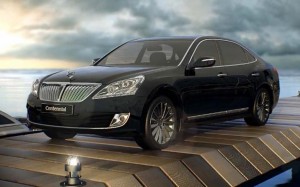Despite record sales this year, Hyundai expects its market share to shrink in the U.S. because of a continuing – and growing — shortage of vehicle resulting from a lack of production capacity.
“We see more demand for our products than we do production,” Hyundai Motor America Chief Executive Officer John Krafcik said during a visit to the Hyundai-Kia Technical Center to show off the updated version of Hyundai’s luxury car, the Equus. “We can’t get a single incremental unit out of our plants,” he said.
Nevertheless, Hyundai is still “on track” to increase sales 4.4% this year, to 734,000 vehicles in the U.S., which means from a sales standpoint, “Our year is going well,” Krafcik added.
In order to build more of the compact Elantra, Hyundai’s best-selling model, it had to reduce production of the mid-sized Sonata, the Korean maker’s U.S. CEO explained. Hyundai now has only a 15-day supply of the Sonata, which remains popular despite the flood of newer midsize models it is going up against. Krafcik added that Hyundai still expects to sell 734,000 vehicles in all this year, an increase of about 3%.
However, the increase in Hyundai sales is unlikely to keep pace with the growth of the overall U.S. market, which is growing at a rate of about 6% for the first half of 2013 — and headed for what will likely be the market’s best year since 2007. Consequently, Hyundai’s market share is bound to shrink as competitors grow faster, Krafcik said.
“We know we can’t sell any more production so it allows us to focus on the other elements of our business,” he said. For the near-term, the company is focusing on things like upgrading its dealerships and the showroom experience, Krafcik has suggested.
But longer-term, the issue of capacity is one the maker cannot ignore.
“Right now there are no plans to add production, but we are evaluating it,” Krafcik said. “We said that we want to get our quality operations systems absolutely ideal in every aspect of the company. Once we have those things running very, very well, we’ll make that decision,” he said.
(Hyundai mulls need for more production. Click Here for more.)
Hyundai’s key U.S. assembly plant in Montgomery, Alabama has been operating on three shifts for nearly a year, he noted. Hyundai added the third shift last September, which bulked up production by 20,000 units annually.
He also noted Hyundai’s top management has opted to hold worldwide capacity at about 7 million units while focusing on improving the overall quality of the company’s vehicles, which has reduced opportunities for growth in other markets, he said.
“I feel that’s the right thing to do,” added Krafcik.
Meanwhile, while the financial markets have been somewhat volatile in recent weeks, the overall economy is getting stronger and more money is available for new vehicle leases, which has helped spur sales this year.
(Hyundai among many makers adding hybrids, taking aim at Toyota Prius. Click Here for more.)
Hyundai actually needs to add more family-oriented crossover vehicles to its line-up to compete more effectively with domestic and Japanese brands, he said. “I think there is still real potential for us in the crossover market,” said Krafcik.
Prices for the new Equus, which is imported from South Korea, will start at $62,000, which is still significantly lower than full-sized, V8-powered premium-luxury competitors such as the Lexus LS, the Mercedes-Benz S-Class and the BMW 7-Series, stressed Ricky Lao, Hyundai product planning manager for full-size and luxury cars, who said sales of the Equus will be limited to about 2,000 units in the U.S.
Hyundai’s Korean sibling, Kia, meanwhile, is also stretching its production capacity to the limits and will be facing questions about its future plans, as well. Kia last week marked a major milestone by rolling out the 1 millionth vehicle assembled at its own U.S. plant, in West Point, Georgia.
The $1 billion assembly plant went into operation on November 16, 2009 producing the 2011 Kia Sorrento crossover. Last year, a $100 million expansion boosted capacity to 360,000 vehicles a year. The 1 millionth vehicle to roll out of the Georgian plant was also a Sorrento, in this case a white 2014 model.
Paul A. Eisenstein contributed to this report.

